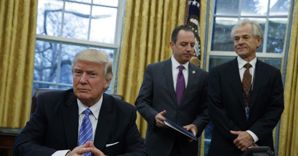BY OUR CORRESPONDENT
BRUSSELS – The european central Bank president Mario Draghi took a confirmation hearing here in Brussels to defend its monetary policy, criticised more and more openly, not only in the United States but also in Germany. At the same time, called it “very worrying,” the announcement of the american administration to loosen the financial rules adopted in the last decade, after the catastrophic failure of Lehman Brothers in 2008.
“our monetary policy has contributed crucially to the current positive developments in the economy,” said the central banker, speaking before the committee on monetary affairs of the european Parliament. Our measures have permeated the fabric of the financial and are now benefiting the real economy, ensuring financing conditions very favourable”. Among other things, the economist has pointed out that unemployment in the euro area is the smallest since 2009.
"The last thing we need is a loosening of regulation. Today, the financial risks are under control, thanks to the work of the regulators in all these years”
Mario Draghi, the president of the european central Bank
An accommodative monetary policy, the reference rate is always zero, “is necessary because the convergence of the inflation rate toward the target set will be done with sufficient confidence and in a sustainable way”. According to the Ecb, the increase in inflation between December and January was dictated primarily by an increase in energy prices and the effect-comparison with the previous year. In the eyes of the central bank, the risks to economic recovery are always to the downside.

Director of Trump: Germany takes advantage of the partners thanks to a euro undervalued
The position it comes as no shortage of criticism of the european monetary policy. In the United States, a leading exponent of the new american administration, Peter Navarro, has argued that the euro is “greatly underestimated”, and what is cashing in Germany (see The Sun/24 Hours of the 1st of February). By the mouth of his minister of Finance, Wolfgang Schaüble, Germany, explained in the weekend that the euro “is too low for the competitiveness of the German economy”.
“When the president of the Ecb has decided to begin an expansionary monetary policy, I told him that would have caused an increase of the export of German (…) I promised at the time not to publicly critique its policy. That said, I don’t want to even be criticized for the consequences of its policy”, said the minister to the newspaper Der Tagesspiegel. In these years the monetary institute has not only brought interest rates to very low levels; it is also buying a man low securities markets.
"The euro is irrevocable. The single european market will not survive in front of competitive devaluations"
Mario Draghi
To a question of a parliamentarian, the independent Marco Zanni, still on the subject of alleged manipulations of the currency, the president Draghi has cited a report by the u.s. Treasury of the 14th of October last, in which Washington stated that Germany does not manipulate its currency and the ECB does not intervene in the markets by the exchange from 2011. “The different monetary policies – said the economist – reflect the different positions in the cycle of the euro area and the United States”. The same Zanni mentioned the possibility for the euro zone and return to national currencies by tying them in a snake like in the 70′s and 80′s. “The euro is irrevocable,” he replied. “The single market” european “will not survive in front of competitive devaluations”, noted the president Draghi on the prospect of a system Sme2 with national currencies exit from the euro. “We have seen what happened in the 70′ s and 80′s. Were certainly years of stability, but of constant competitive devaluations”.
Always in front of the european Parliament, the central banker stressed that “the monetary institute must look to the euro area as a whole”. Also in this case, the gaze of the president of the Ecb is of course to Germany, where the rate of inflation in January was 1.9% per annum, and where the unemployment rate in December was 3.9% of the active population. There is a clear risk of overheating of the economy in the Federal Republic.
A parliamentary, Marco Valli of the Five Star Movement, he then appealed to the central banker on the hypothesis of the Union of variable geometry emerged tangentially at a summit in Malta last week: “it Is too early to comment he replied,” the economist –. You do not understand who, how, what, where. The concept has not been developed. It is, as they say, of a vision just abozzata. I can not make any comment at this stage”.

Trump dismantles the reform of the finance of Obama
the president of The ECB has criticised the american administration after it announced the desire to loosen financial regulations, decided after the 2008 crisis. “The last thing we need is a loosening of the regulation – said Mario Draghi –. Today, the financial risks are under control, and this is thanks to the work of the regulators, ( … ) in these years.” Whether we are discussing to review the banking rules after having strengthened the credit institutions “is very worrying”.
© Reproduction reserved
No comments:
Post a Comment